

Allen
Is Online Learning as Good as Face-to-Face Learning? Is online education as effective as traditional on-campus schooling? – Juggle.com. The great debate: is e-learning effective? Central Government, Education IT, Healthcare IT 25 August 2009 | Views: 13887 Is e-learning really effective?

Or is it a buzzword that promises much but deliver less? Trying to learn a language online has been likened to learning how to swim without entering the water. But more learning is likely to be delivered electronically in the future. Inchone is running an e-learning programme for a major regional sporting event, which requires 20,000 volunteers to be trained in the next year. Student experiences the Gold Standard in Online Education with Jones International University - JIU. Benefits of E-Learning. The Future of Online Teaching and Learning in Higher Education: The Survey Says… (EDUCAUSE Quarterly. The Future of Online Teaching and Learning in Higher Education: The Survey Says... A survey substantiates some ideas about online learning and refutes others By Kyong-Jee Kim and Curtis J. Bonk Institutions of higher education have increasingly embraced online education, and the number of students enrolled in distance programs is rapidly rising in colleges and universities throughout the United States.
In response to these changes in enrollment demands, many states, institutions, and organizations have been working on strategic plans to implement online education. In part, this confusion swells as higher education explores dozens of e-learning technologies (for example, electronic books, simulations, text messaging, podcasting, wikis, blogs), with new ones seeming to emerge each week. The Future of E-Learning Is More Growth. Research The Future of E-Learning Is More Growth By virtually every measure, electronic learning is experiencing unprecedented growth and will continue to do so for the foreseeable future.
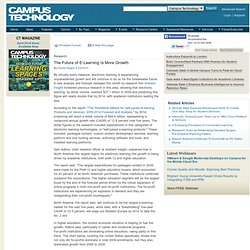
A new analysis and forecast released this month by research firm Ambient Insight bolstered previous research in this area, showing that electronic learning, by dollar volume, reached $27.1 billion in 2009 and predicting this figure will nearly double that by 2014, with academic institutions leading the way. According to the report, "The Worldwide Market for Self-paced eLearning Products and Services: 2009-2014 Forecast and Analysis," by 2014, e-learning will reach a dollar volume of $49.6 billion, representing a compound annual growth rate (CAGR) of 12.8 percent over five years. Ten Years On. An MS-Word version of this essay is available at Spanish Translation, by Diego Leal.
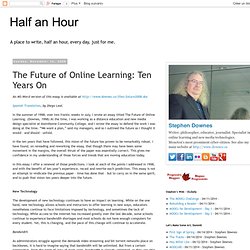
In the summer of 1998, over two frantic weeks in July, I wrote an essay titled The Future of Online Learning. (Downes, 1998) At the time, I was working as a distance education and new media design specialist at Assiniboine Community College, and I wrote the essay to defend the work I was doing at the time. “We want a plan,” said my managers, and so I outlined the future as I thought it would – and should – unfold. In the ten years that have followed, this vision of the future has proven to be remarkably robust. Challenges and Disadvantages of E-learning and Distance Learning. Is Online Learning Right for Me? How could there possibly be any disadvantages of online courses?
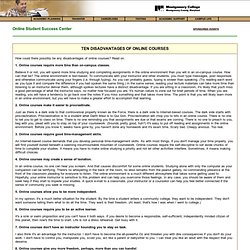
Read on. 1. 5 Disadvantages of Online Learning. Everyone's different. And because we're all such unique individuals, we all have distinct learning methods that best help us forge through our educational pursuits. Some of us learn best through hands-on methods, while others have terrific memories and find that sticking to text books help them best retain the material at hand. If you're going to spend your precious time and hard earned money getting an education, then you're going to want to make sure you learn by the best methods possible. Is Online Learning Right for Me? Benefits of Online Learning. Online learning is on the rise.

According to a 2013 report by the Babson Survey Research Group, over 6.7 million postsecondary students were enrolled in at least one online class in 2011, compared to only 1.6 million in 2002, and higher-education institutions continue to refine and enhance their online curriculum. In 2002, about 72 percent of these schools offered some form of online learning, and that number has steadily increased to nearly 87 percent in 2012. Colleges also have emphasized the creation of fully online degree programs, and 62 percent of the schools surveyed now award degrees entirely through distance education. Advantages of Online Learning. The Internet has helped the tutoring industry in many ways over the last several years.

There are so many advantages of online learning that traditional tutoring just can’t compete. The benefits are on both sides of the spectrum, for the tutor and for the student.The programs that allow tutoring online have come far over the last several years. The option to use strictly email is still one method of receiving help but not necessarily the best.
The back and forth nature is not always the most beneficial to either the student or the tutor. Now there are many online ways to receive tutoring that is interactive. Students today are very computer and electronic oriented. Why E-Learning is So Effective. E-learning is hot.

And for good reason. If done right, it can produce great results by decreasing costs and improving performance. Also, unlike a one time classroom session, the elearning course is available for others. This includes the static elearning course as well as any ongoing conversations in networked communities. Recently, I had a conversation with someone new to elearning and it struck me that she didn’t fully understand the value of elearning. E-learning Supports the Organization’s Goals Improved training costs. 5 Great Benefits Of Online Learning. The Evidence on Online Education. WASHINGTON -- Online learning has definite advantages over face-to-face instruction when it comes to teaching and learning, according to a new meta-analysis released Friday by the U.S.
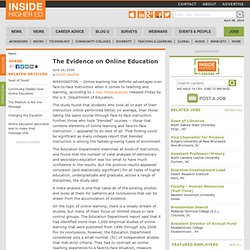
Department of Education. The study found that students who took all or part of their instruction online performed better, on average, than those taking the same course through face-to-face instruction. Further, those who took "blended" courses -- those that combine elements of online learning and face-to-face instruction -- appeared to do best of all. That finding could be significant as many colleges report that blended instruction is among the fastest-growing types of enrollment. The Education Department examined all kinds of instruction, and found that the number of valid analyses of elementary and secondary education was too small to have much confidence in the results. Using technology to give students "control of their interactions" has a positive effect on student learning, however.
John R. USDE 2009 Report on Effectiveness of Online Learning. The following excerpts are from Evaluation of Evidence-Based Practices in Online Learning: A Meta-Analysis and Review of Online Learning Studies (Washington, D.C., 2009), conducted by the U.S.
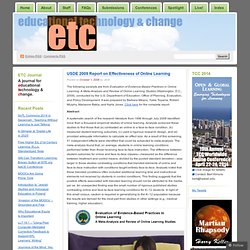
Department of Education, Office of Planning, Evaluation, and Policy Development. It was prepared by Barbara Means, Yukie Toyama, Robert Murphy, Marianne Bakia, and Karla Jones. Click here for the complete report. Abstract A systematic search of the research literature from 1996 through July 2008 identified more than a thousand empirical studies of online learning.
Executive Summary. Is Online Education More Effective Than Traditional Learning? One of the fastest growing uses of technology is for online education.
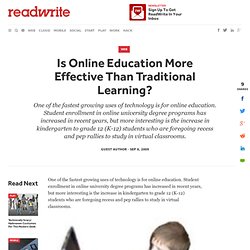
Student enrollment in online university degree programs has increased in recent years, but more interesting is the increase in kindergarten to grade 12 (K-12) students who are foregoing recess and pep rallies to study in virtual classrooms. Study: Online learning less effective for some. Report contradicts federal study claiming web-based learning is equivalent to or better than face-to-face schooling By Dennis Carter, Assistant Editor Read more by Denny Carter Classroom students scored 84.5 percent on the first exam in the economics course, and online students scored 83.3 percent. Higher education’s embrace of online courses could hurt the performance of some groups of students, according to a study that contradicts the findings of a 2009 report from the U.S. Department of Education (ED) showing that online students perform as well, or better, than their peers in face-to-face settings on average.
Research published by the National Bureau of Economic Research (NBER) suggests that males, Hispanics, and low-performing students might fare worse in web-based classes than they do in the traditional classroom—a problem exacerbated by the high rate of online course adoption at community colleges and “less selective institutions,” where these three groups are most likely to attend. Professors Regard Online Instruction as Less Effective Than Classroom Learning - Distance Education. By David Shieh Washington Online courses may be gaining a foothold in higher education, but substantial skepticism over their effectiveness remains, according to results of two recent surveys. The surveys, conducted by the National Association of State Universities and Land-Grant Colleges, also found "widespread concern" that budget cuts would hamper distance-learning programs. The preliminary results of the surveys, which polled faculty members and administrators separately about their opinions of distance-learning programs, were unveiled here Monday at the American Council on Education's conference.
The survey of faculty members found that while a majority of faculty members acknowledge that distance instruction offers students increased accessibility and flexibility, developing and teaching online courses can be burdensome. Full survey results are scheduled for release in April. Study: Online learning might be less effective for some. Report contradicts federal study claiming web-based learning is equivalent to or better than face-to-face schooling By Dennis Carter, Assistant Editor Read more by Denny Carter September 15th, 2010 Classroom students scored 84.5 percent on the first exam in the economics course, and online students scored 83.3 percent.
Higher education’s embrace of online courses could hurt the performance of some groups of students, according to a study that contradicts the findings of a 2009 report from the U.S. Department of Education (ED) showing that online students perform as well, or better, than their peers in face-to-face settings on average. The rush to make online courses widely available and save colleges money in difficult economic times might be “inadvertently … harming a significant portion of their student body,” according to the study, which was funded by the National Science Foundation and ED. Read the full story on eCampus News.